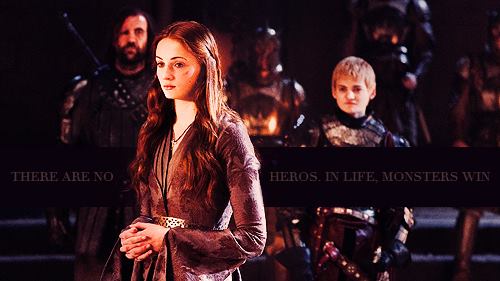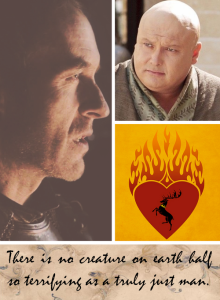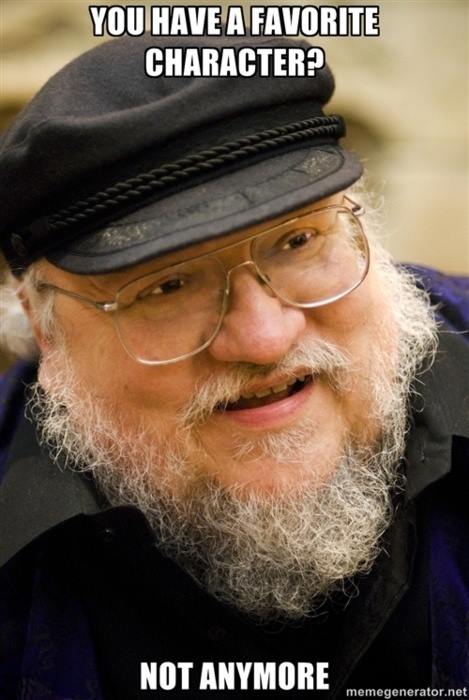In life, the monsters win.
A Game of Thrones, Chapter VIThere is no creature on earth half so terrifying as a truly just man.
Chapter XIV
If we have learned anything from Game of Thrones (the books or the TV series), it is this: the seemingly noble qualities of justice and mercy can have dire, even deadly consequences. (Spoilers ahead.)
I knew the Red Wedding scene was coming from the moment the show started its run in 2011, but I can still say I was surprised that the show presented it in such a brutal manner. The addition of Talisa, a character who does not appear in the books, as well as the news of her pregnancy, added an element of brutality absent even from the books. Much of the reaction I have seen (from people who did not know that the Red Wedding was coming) has focused on bemusement, or even rage, that the show would kill off its main character, Robb Stark.
I have two thoughts in response to that sentiment: (1) Have you learned nothing from the death of Ned Stark? That was not a narrative outlier. (2) Why assume Robb Stark is the central character, or hero?
This is not to take anything away from the emotional impact of the Red Wedding. I read that scene in 2007 or 2008, and felt like I had been hit by something large and blunt wielded by the Hound. Even George R.R. Martin had difficulty writing the scene. An article by Paul Waldman at The American Prospect captured the narrative shock of Robb Stark’s death, when compared to Ned Stark’s death:
George R. R. Martin obviously has a good understanding of narrative conventions and is more than happy to subvert them. When Ned Stark was executed, it was so shocking not only because it left viewers without the person with whom they assumed they were supposed to most identify, but because the scene itself felt so familiar, right up until the moment when the blade met Ned’s neck. We’ve seen it repeated a thousand times, in every action or adventure story. At some point, the hero always suffers a setback—he is captured by his enemies, or he is betrayed by one he trusted, or he’s injured and looks on the verge of defeat. Then at the last moment, he finds some clever way to escape and triumph. Those who hadn’t read the books were waiting for that moment as Ned stood before the king, the executioner, and the crowd. And then his head rolled away.
But his son Robb’s death was portrayed in an entirely different way. It wasn’t preceded by a lengthy countdown; it was sudden and shocking, challenging expectations in a different way. “It’s kind of ridiculous that Robb Stark is killed so simply,” [NYU literature Professor Karen] Hornick says. If he’s a heroic warrior, we expect his death to be filmed with grandeur, maybe even in slow motion. And in the story, it has to serve some higher redemptive purpose, such as a noble sacrifice for the purpose of saving others. But it didn’t happen that way. Robb just died, along with his wife, his mother, and his army. Martin and the show’s creators found a different way to confound our expectations of what happens to heroes.
After the episode with the Red Wedding aired last weekend, my wife asked me where the story could possibly go after that. I pointed out that Tyrion Lannister, Jon Snow, Daenerys Targaryen, Arya Stark, Sansa Stark, Bran Stark, Davos Seaworth, and Theon Greyjoy still have their story arcs more or less intact, but it is certainly true that what seemed to be the central conflict of the story, i.e. the Starks versus the Lannisters, is mostly at an end. This is part of the brilliance of the story, in that it always keeps the reader/viewer guessing.
I. What We Learned from Ned Stark
Ned Stark was often a less-than-inspiring hero, as demonstrated by the “Stupid Ned Stark” meme that prevailed during the first season of the show. He was deeply principled and committed to honor, and it pretty much killed him. As he told Varys in the dungeon, “the madness of mercy” led him to tell Cersei that he knew her big secret, in order to give her an opportunity to flee King’s Landing with her children. It never seemed to have occurred to him that she might instead have the king killed and take power herself. That didn’t work out too well for her, as Joffrey proved impossible to control, but it worked out much worse for Ned.
Had Ned taken Littlefinger‘s advice and thrown his support behind Joffrey, it is possible that they could have tempered some of Joffrey’s abuses, at the very least by depriving him of the power trip of ordering Ned’s execution. Had Ned taken Renly Baratheon‘s advice and joined with him to take up arms against the Lannisters, who knows what might have happened, but there’s a better chance Ned would still be alive.
Robb Stark was undoubtedly his father’s son. He often chose honor over pragmatism. His marriage to Talisa, in direct violation of his oath to Walder Frey, is different from his marriage in the books to Jeyne Westerling. He married Talisa for love, but in the books he married Jeyne for honor. Either way, he put his own honor and sense of duty over what turned out to be more important obligations.
A better example of Robb’s lack of pragmatic thinking was his execution of Rickard Karstark. Karstark committed an unspeakable crime, to be certain, killing two Lannister children in vengeance for the death of his son. At least the show changed the story so that Jaime Lannister murdered Karstark’s son in cold blood, as opposed to on the battlefield (not that I think it makes a difference, but it would make a difference in Westeros.) Robb Stark had the choice of executing Karstark for treason, or holding him captive in order to secure the continued loyalty of Karstark’s soldiers. He chose execution, which was presumably more honorable. Karstark even taunted him about his tendency towards mercy (i.e. Catelyn Stark). The execution led to the mass desertion of the Karstarks, requiring Robb to ask for help from Walder Frey, and the rest is history. Robb may have been honorable, but that’s pretty much what got him killed. The Lannisters and Roose Bolton also got him killed, but Robb’s stubborn honor made it easier for them.
II. Why Ned/Robb Stark Was Not the “Hero”
Two major themes of both Game of Thrones and A Song of Ice and Fire, in my opinion, are that outward heroism masks inner weakness, and that almost no one is uniformly “good” or “evil.” From the beginning, readers/viewers have struggled with viewing Tyrion Lannister as a protagonist when he is basically aligned with the clear antagonists. During the Battle of the Blackwater, we had the choice of rooting for the Lannisters defending King’s Landing or Stannis Baratheon’s forces. I think most people just rooted for Tyrion. In fact, Tyrion Lannister is now probably the closest thing to a main protagonist the show has, and he is formally allied with the characters we hate the most.
We also saw a major crack in Sandor “The Hound” Clegane’s facade in the Blackwater scene, when he faced his mortal fear of fire and abandoned the city. He offered to take Sansa Stark with him, and in doing so made us realize that, for all his cruelty towards her, he had done more to protect her than anyone else since her father’s death. Later, the Hound captured Arya Stark, but did so in order to return her to her family. Without ever attempting to justify his many crimes, George R.R. Martin turned him into an ally of a protagonist, if not a protagonist himself.
Much the same could be said of Jaime Lannister, for whom we might actually feel some semblance of pity. Yes, he’s a monster, but damn has life dealt him all kinds of shit. Again, without ever justifying or forgiving his crimes, we find ourselves rooting for Jaime’s efforts to redeem himself, through his rescue of Brienne and other events that I won’t mention because the show hasn’t gotten there yet.
Jaime also provides a valuable perspective, the “villain’s” view of the “hero.” We have always assumed that Ned Stark was the hero and Jaime Lannister the villain, but Jaime makes a plausible case otherwise. The title “Kingslayer” has followed Jaime his entire adult life, and he is condemned among many of the highborn for breaking his oath to King Aerys. We now know that Jaime killed the previous king in order to stop him from burning King’s Landing to the ground, saving over 100,000 lives. He should have been the hero of the day, but instead he is the Kingslayer. He blames Ned Stark’s sense of honor for this, as he did not believe Ned would accept saving the life of everyone in the city as justification for breaking his oath. From what we know of Ned Stark, he’s probably right, and so we have another example of honor as a destructive force.
All of that said, I would not call Jaime Lannister, Tyrion Lannister, Sandor Clegane, or anyone else the “hero” of this story. I do not think this story has a hero. Although it takes place in a fantasy world with dragons and the Lord of Light, the story of Game of Thrones is rooted firmly in reality. Everyone has the capacity for evil, especially when they intend to do good, and even the worst characters of them all can have their good moments. That is how the real world works. Deal with it.




